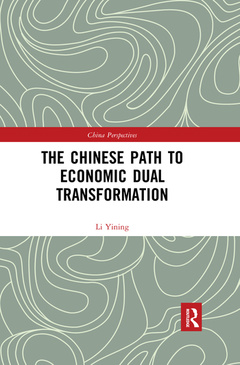The Chinese Path to Economic Dual Transformation China Perspectives Series
Auteur : Yining Li

Economic transformation in traditional development economics refers to the transition from an agricultural society to an industrial one. Based on the practical conditions and the experience since reform and opening up in the late 1970s, the author observes that the path China's economy takes is a dual transformation, namely, developmental transformation from an agricultural society to an industrial economy, and institutional transformation from planned economy to market economy.
Centering on property ownership reform which is the supreme reform of the dual transformation, this book discusses land ownership approval, stock-holding system reform and the maintaining ownership of private enterprises, etc. Besides, the book expounds on the urbanization in China, believing that it is not only the outcome of the dual transformation but also the booster that will help China's economy continue to develop at a high speed. Independent innovation and industrial upgrading which is the key to the enhancement of enterprises' competitiveness is also covered.
The combination or overlapping of the two types of transformations in China has had no precedent in history, and it has not been discussed in traditional development economics. Scholars and students in China's economic studies and development economics studies will be attracted by this book. In addition, this book will be a valuable reference for other developing countries which are undergoing economic transformation.
Introduction: Dual Transformation of the Chinese Economy Chapter 1 Significance of Defining Land Ownership Chapter 2 Coordinated Development of State and Private Enterprises Chapter 3 Changes in the Mode of Economic Development Chapter 4 Macroeconomic Regulation and Control Chapter 5 Reform of the Income Distribution System Chapter 6 Urbanization Chapter 7 Independent Innovation and Industrial Upgrading Chapter 8 Social Capital and Corporate Social Responsibility Provisional Summary: The China Path and New Progress in Development Economy. Postscript to the Chinese Edition. Index
Li Yining is a professor of Guanghua School of Management, Peking University. His research focuses on economic theories and macroeconomics.
Date de parution : 04-2020
15.6x23.4 cm
Date de parution : 09-2017
15.6x23.4 cm
Thèmes de The Chinese Path to Economic Dual Transformation :
Mots-clés :
Demand Pull Inflation; Collective Forest Land; China's economic dual transformation; Rural Social Security Systems; LI Yining; Specialised Farmer Cooperatives; Economic Development; Collective Forest; Family Forest Land; Macroeconomic Regulation; Property Ownership Reform; Dual Transformation; Market Entity; Deposit Reserve Ratio; Rural Reform; Forest Land; Share-holding Reform; Household Registration Systems; State-owned Enterprises; Grassroots Finance; Land Circulation; Defining Land Ownership; China’s Manufacturing Industry; Reform Dividends; Homo Sociologicus; Income Distribution System; Forestry Cooperatives; Urbanization; Virtual Economy; The China Path; Moral Bottom Line; Social Capital; Cost Push Inflation; Chifeng City; Primary Distribution; Industrial Shifts; Secondary Distribution



